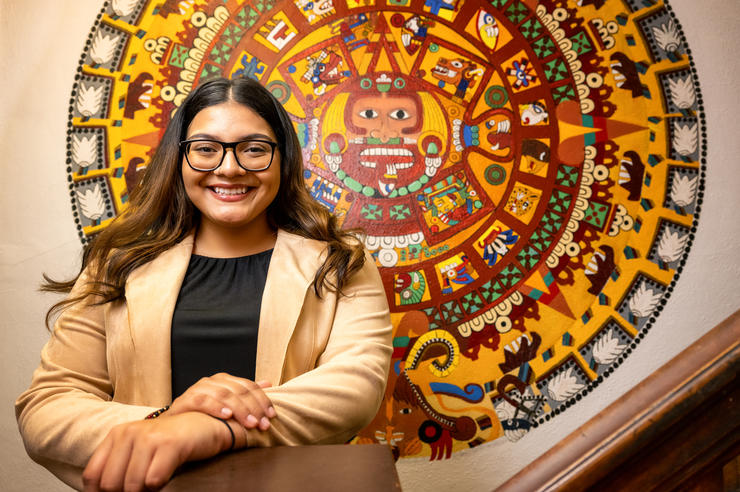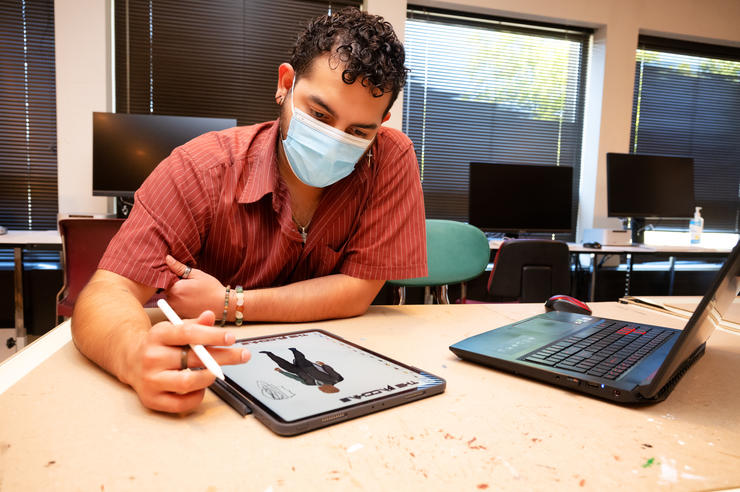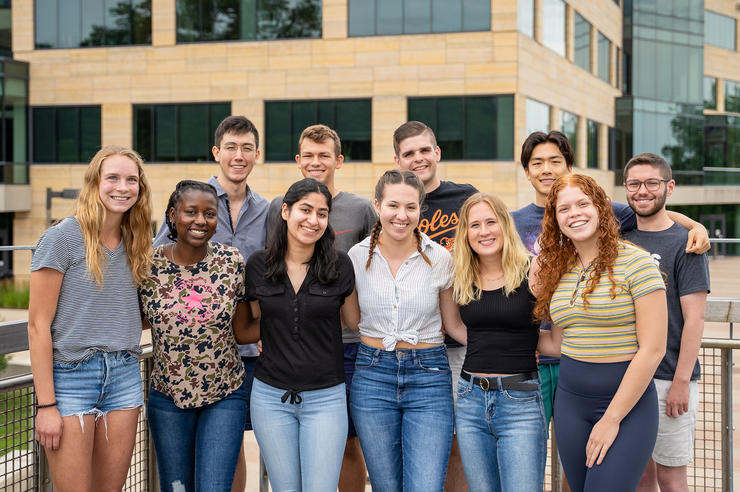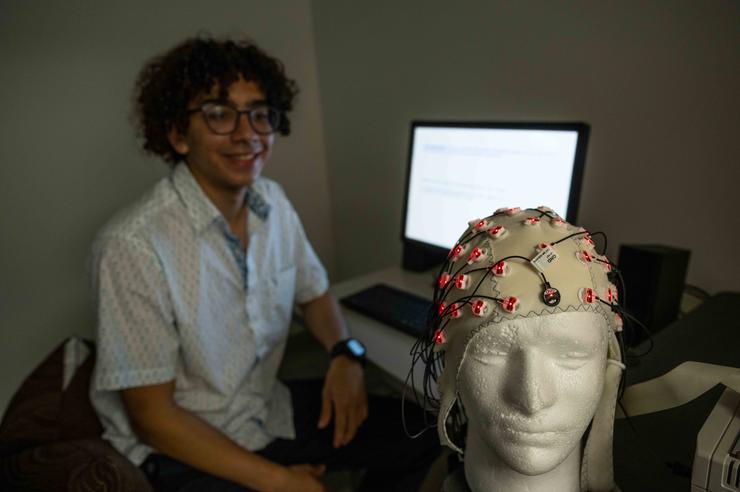Sisters lead way in improving lives of patients, students
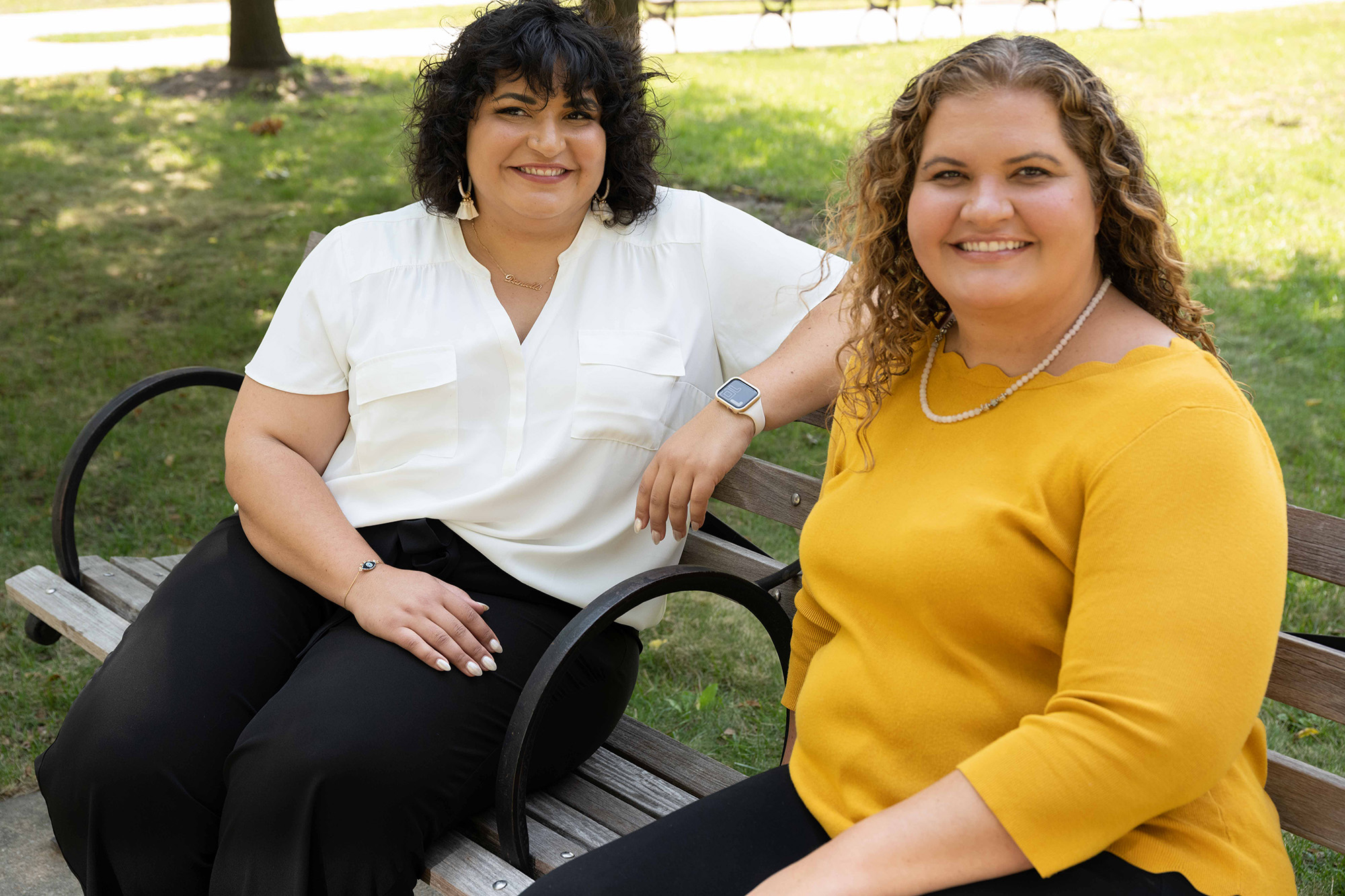
The Martinez sisters are leaving their marks on both sides of the Iowa River on the University of Iowa campus through their tireless leadership efforts.
Denise Martinez, MD, is a family medicine physician, interim associate vice president for health parity for University of Iowa Health Care, and associate dean for the Carver College of Medicine’s Office of Diversity, Equity, and Inclusion. Danielle Martinez is director of student retention in Academic Support and Retention.
And while they work hard to improve the lives of their patients, students, and colleagues, the sisters say that it’s important, particularly during Latinx Heritage Month, to remember their family’s journey and how it brought them where they are now.
After hurricanes devastated Puerto Rico’s sugar industry in 1899, thousands of Puerto Ricans relocated to Hawaii in the early 20th century to work its sugar cane plantations. Denise and Danielle’s family was among them.
“Going from sugar cane plantation workers to interim associate vice president of a major health system is a big leap over a couple of generations,” Denise says. “It’s important to remember the struggles and successes.”
“It’s also important to share that we have and will always work to pave the way for other communities and so we must partner with those in our professions to address systemic barriers that promote inequities,” Danielle says.
Denise and Danielle Martinez are each involved with programs at Iowa that are particularly close to their hearts. For Danielle, one is First Gen Hawks, which is designed to equip students whose parents or guardians do not have a four-year degree with the tools, resources, and support they need to help them reach their goals.
For Denise, it’s the Summer Health Professions Education Program (SHPEP), a free, six-week summer program for undergraduate students interested in health professional careers. It’s actually the same program that she took part in after her advisor told her she wouldn’t make it to medical school.
“These pipeline programs invest in our future,” Denise says. “We absolutely need people from rural backgrounds, minority backgrounds, first-gen backgrounds, all of those diverse backgrounds in health care. The data shows that will improve health care for everybody.”
While the Martinez sisters grew up in Seattle, Hawaii, California, and Chicago, it is because of Denise that they both, along with their parents, now call Iowa home.
Denise knew she wanted to be a doctor at the age of 4—when her little sister, Danielle, was born. But her path to medical school wasn’t without bumps.
“I was one of those students who was told by their pre-med advisor that they would never be a doctor,” Denise says. “Unfortunately, this is not an uncommon thing for folks who are underrepresented to be told.”
Denise got into a summer program at the University of Washington for minority pre-med students to help them get into medical school—and then attended Tufts University School of Medicine.
She interviewed at hospitals across the country, and University of Iowa Hospitals & Clinics ended up being her top choice.
“The people here were supportive and really collaborative, which isn’t always the case everywhere,” Denise says. “I also liked that family medicine and primary care were really respected here.”
Denise experienced pretty quickly the true kindness of the people in Iowa. Two weeks after moving to Iowa City and into her newly constructed condo, the 2008 flood destroyed it.
“Everyone rushed to help me get everything out,” Denise says. “I ended up living with the chair of my department for a month while I tried to get back on my feet. I think at least 50 people offered to let me live with them. How very Iowa is that?”
Meanwhile, Danielle says she was the typical overinvolved student when she was in college.
“I was a campus tour guide. I was an RA. I worked in student government. In many clubs,” Danielle says. “I participated in all the things.”
She received a degree in communications and public relations at Central Washington University, but she realized even before graduation that it wasn’t really what she wanted to do.
Her senior year, someone suggested she go into student affairs—a profession she admits she had no idea even existed. She got her master’s degree in student affairs in higher education at Colorado State University and worked at institutions in California, Washington, and Chicago. When her job in Chicago turned out to not be a good fit, Danielle moved to Iowa City to be with her sister, Denise.
Danielle says she only planned to stay for a couple of months. That was 2013.
She took a summer position in the Center for Academic and Inclusive Excellence, which turned into a year contract. She then was invited to apply for a job in Academic Support and Retention, starting as an assistant director, moving to an associate director, and now serving in a director role in the office.
“I stay in Iowa because I have family here: my parents, Denise, her partner, and my nephew who I’m desperately in love with,” Danielle says. “I also have an extraordinarily supportive supervisor, wonderful colleagues, and I get to do a lot of interesting things. My job has never been the same year to year. I’ve stayed to support student success, particularly students of color, LGBTQ+ students, and first-generation college students.”
“Going from sugar cane plantation workers to interim associate vice president of a major health system is a big leap over a couple of generations. It’s important to remember the struggles and successes.”
The sisters work extensively on diversity, equity, and inclusion initiatives, areas in which they say the COVID-19 pandemic exacerbated some already-difficult challenges.
However, they say as everyone is figuring out what the new normal is, they and their colleagues are working to discover what works in today’s world to best support increasingly diverse students, patients, faculty, and staff.
“There have been large investments in health parity and focusing on how we improve the health for all Iowans,” Denise says. “I was the associate dean of DEI and now I’m the interim associate vice president of the health care system, so there’s also a whole new level of leadership that has been advocated for, which is amazing.”
On the academic side, Danielle says they are working to build an infrastructure that creates a seamless, integrated experience that supports the success of all students.
“Students know that we value diversity, but there might not always be some physical representation that acknowledges that in certain ways, so we’re looking to find those nooks and crannies,” Danielle says. “We want to create a space for students to thrive in and to meet their personal and professional goals, so that when they leave this place, they can make a positive impact in their communities.”
During the COVID-19 pandemic, Danielle Martinez was able to return the favor of living with her sister, Denise Martinez, when she first moved to Iowa City.
Their parents had retired and moved to Iowa to live with Denise’s family. But with Denise a frontline physician and their mother immunocompromised, the sisters didn’t want to put her at risk. So, Denise, her partner, and their baby moved into Danielle’s two-bedroom, 600-square-foot apartment for nearly nine months.
“We all lived and worked there trying to protect my parents,” Danielle says. “We had some fun times, but it was a lot of people in a very small space. But still, it’s nice to have family around.”
Denise and Danielle say growing up around multiple cultures has been helpful in navigating the many different spaces they find themselves in.
“We would formally call it code switching, but our ability to navigate multiple spaces, multiple identities, has, I think, helped us be really successful,” Danielle says. “I think it’s one of those skills that people from marginalized identities develop and are really good at.”
Although the sisters work on different sides of the river, they still find themselves working together from time to time.
“I’ve gone over to talk to her students, and she’s come over to speak to my Summer Health Professions Education Program (SHPEP) students,” Denise says. “Also, I know everyone on my side of the river, and she knows everybody on her side, so if one of us has a question about who is best to call, the other probably can point her in the right direction.
“Plus, there is a lot of idea-bouncing between us.”
Danielle and Denise are passionate about giving future generations the best start possible and want students to know one thing.
“You can make it in whatever you want to do,” says Denise, who also wants to let students looking to go into medicine in on a secret. “I know people can think that being a doctor is not attainable and they are so much higher than everybody else, but the truth is that they are regular people. The students I meet are extraordinary and capable of making their communities better places to live. They are the game-changers.”
